大学英语4GE期末考试题型和分值【精选】
2023年大学_大学英语四、六级考试新题型调整的说明
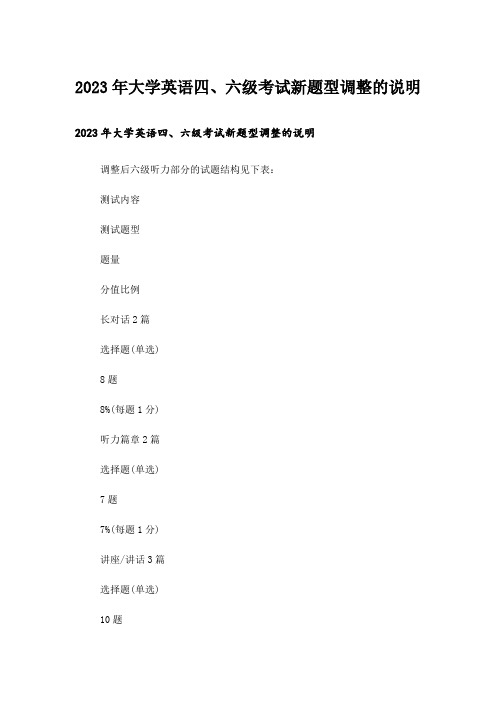
2023年大学英语四、六级考试新题型调整的说明2023年大学英语四、六级考试新题型调整的说明调整后六级听力部分的试题结构见下表:测试内容测试题型题量分值比例长对话2篇选择题(单选)8题8%(每题1分)听力篇章2篇选择题(单选)7题7%(每题1分)讲座/讲话3篇选择题(单选)10题20%(每题2分)1、六级听力之不变原来的长对话题型不变,依然是2篇。
但题目数量由7道题增至8题,依然每题1分;篇章听力题型不变,但题目数量由原来的3篇共10道题减少至2篇共7题,每题1分。
题型及难度没有变化,考生可参考旧题。
2、六级听力之变化短对话取消,听写取消。
增加讲座/讲话题型3篇共10道题,每题2分,是六级听力考试乃至全卷的关键。
下面我们就来详细解析一下新题型:Now listen to the following recording and answer questions 16 to 19.16. A) They investigate the retirement homes in America.B) They are on issues facing senior citizens in America.C) They describe the great pleasures of the golden years.D) They are filled with fond memories of his grandparents.17. A) The loss of the ability to take care of himself.B) The feeling of not being important any more.C) Being unable to find a good retirement home.D) Leaving the home he had lived in for 60 years.18. A) The loss of identity and self-worth.B) Fear of being replaced or discarded.C) Freedom from pressure and worldly cares.D) The possession of wealth and high respect.19. A) The urgency of pension reform.B) Medical care for senior citizens.C) Finding meaningful roles for the elderly in society.D) The development of public facilities for senior citizens.原文:Moderator:Hello Ladies and Gentleman, it gives me great pleasure to introduce our keynote speaker for todays session, Dr. Howard Miller. Dr. Miller, Professor of Sociology at Washington University, has written numerous articles and books on the issues facing older Americans in our graying society for the past 15 years. Dr. Miller:Dr. Miller: Thank you for that introduction. Today, Id like to preface my remarks with a story from my own life which I feel highlights the common concerns that bring us here together. Several years ago when my grandparents were well into their eighties, they were faced with the reality of no longer being able to adequately care for themselves. My grandfather spoke of his greatest fear, that of leaving the only home they had known for the past 60 years. Fighting back the tears, he spoke proudly of the fact that he had built their home from the ground up, and that he had pounded every nail and laid every brick in the process. The prospect of having to sell their home and give up their independence, and move into a retirement home was an extremely painful experience for them. It was,in my grandfathers own words, like having a limb cut off. He exclaimed in a forceful manner that he felt he wasnt important anymore.For them and some older Americans, their so-called “golden years”are at times not so pleasant, for this period can mean the decline of not only ones health but the loss of identity and self-worth. In many societies, this self-identity is closely related with our social status, occupation, material possessions, or independence. Furthermore, we often live in societies that value what is “new” or in fashion, and our own usage of words in the English language is often a sign of bad news for older Americans. I mean how would your family react if you came home tonight exclaiming, “Hey, come to the living room and see the OLD black and white TV I brought!” Unfortunately, the word “old” calls to mind images of the need to replace or discard.Now, many of the lectures given at this conference have focused on the issues of pension reform, medical care, and the development of public facilities for senior citizens. And while these are vital issues that must be addressed, Id like to focus my comments on an important issue that will affect the overall success of the other programs mentioned. This has to do with changing our perspectives on what it means to be a part of this group, and finding meaningful roles the elderly can play and should play in our societies.First of all, Id like to talk about . . .16. What does the introduction say about Dr. Howard Millers articles and books?17. What is the greatest fear of Dr. Millers grandfather?18. What does Dr. Miller say the “golden years” can often mean?19. What is the focus of Dr. Millers speech?解:这是一篇关于老龄化社会,老年人的晚年生活等问题的演讲。
重庆大学《大学英语》(1-4)考试大纲

重庆大学《大学英语》(1-4)考试大纲课程类别:基础必修课总学时数:256学时学分:14学分一、考试要求大学英语课程是我校非英语专业大学生的一门重要的必修基础课程,其教学目标是培养学生的英语综合应用能力,特别是听说能力,使他们在今后工作和社会交往中能用英语有效地进行口头和书面的信息交流。
因此,大学英语考试的目的在于准确地衡量我校大学生的英语综合应用能力和自主学习能力。
大学英语每一学期的测试分为四个级别:1、2、3、4级,由专门小组负责出题、课程教授审题,以密封卷形式集体流水阅卷、集体登分,任课老师负责把学生的成绩登录上网,学生在网上查看自己的成绩。
二、考试内容1、期末考试内容、题型和分值比例试卷由七部分组成:翻译(1级)或写作(2、3、4)级(15%),阅读(20%),听力(35%),完型填空(10%),信息转换(10%),选词填空(5%),改错(5%),总分100分。
Part I Translation (Band 1) (15 points):5个句子,汉译英Writing (Band 2.3.4) (15 points):短文写作Part II Reading Comprehension (20 points):多项选择,2篇文章,共10题。
Part III Listening Comprehension (35 points):对话(多项选择:短对话,长对话);短文理解(多项选择)和复合式听写。
Part IV Cloze Test (10 points):多项选择Part V Information Transfer (10 points):信息转换词汇填空Part VI V ocabulary (5 points):选词填空Part VII Error Correction (5 points)2、题型分解考试各部分所考核的内容和答题方式如下:(1) 写作和翻译部分考核学生用英语进行书面表达的能力。
2016级大学英语 I 期末考试题型及分值(新视野)
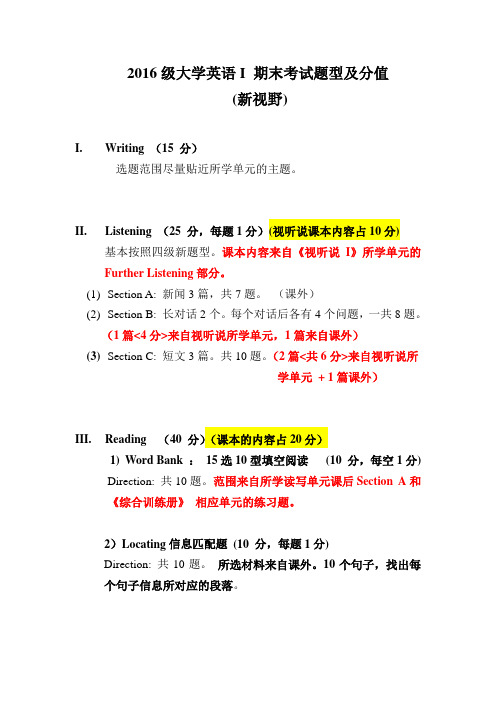
2016级大学英语I 期末考试题型及分值(新视野)I.Writing (15 分)选题范围尽量贴近所学单元的主题。
II.Listening (25 分,每题1分)(视听说课本内容占10分) 基本按照四级新题型。
课本内容来自《视听说I》所学单元的Further Listening部分。
(1)Section A: 新闻3篇,共7题。
(课外)(2)Section B: 长对话2个。
每个对话后各有4个问题,一共8题。
(1篇<4分>来自视听说所学单元,1篇来自课外)(3)Section C: 短文3篇。
共10题。
(2篇<共6分>来自视听说所学单元+ 1篇课外)III.Reading (40 分)(课本的内容占20分)1)Word Bank :15选10型填空阅读(10 分,每空1分)Direction: 共10题。
范围来自所学读写单元课后Section A和《综合训练册》相应单元的练习题。
2)Locating信息匹配题(10 分,每题1分)Direction: 共10题。
所选材料来自课外。
10个句子,找出每个句子信息所对应的段落。
3)In-depth reading (20 分,每题2分)Direction: 2篇,每篇5个问题,共10题。
课内1篇+ 课外1篇,课内的范围来自于《综合训练册》相应读写单元的选择题型篇章阅读。
IV. English-to-Chinese Translation (10分) (课本内容占10分)“英译汉”段落翻译。
要求:本题为翻译一段约80-100字的英语段落。
材料选自所学读写单元text A的课文某段落。
V.Chinese-to-English Translation (10分) (课本内容占10分)“汉译英”段落翻译。
要求:本题为翻译一段约120字的汉语段落,考察长句翻译的技巧,语言点的运用和语内连贯的处理。
材料选自所学读写单元text A的课后练习& 《综合训练册》相应单元的汉译英段落翻译习题。
大学英语期末考试题型及分值-浙江万里学
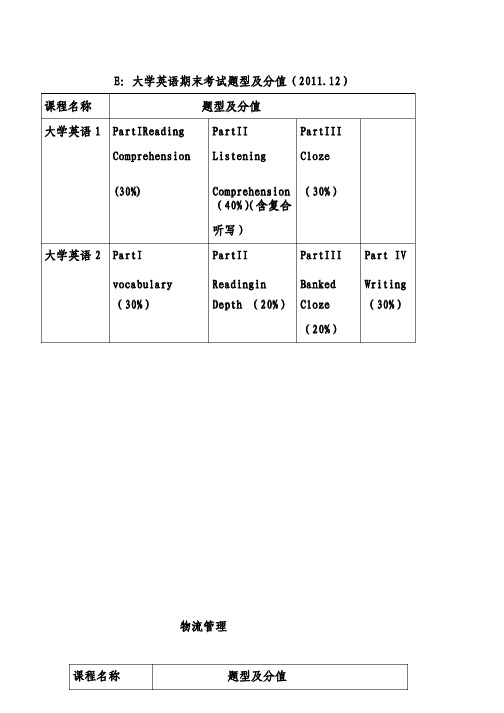
(30%)
教育创新班
课程名称
题型及分值
大学英语阅读 PartIReading PartII
(一)
Comprehension Readingin
PartIII vocabulary
(30%)
Depth (30%) (40%)
大学英语听说 PartI
PartII
(一)
OralTest(60%) Listening
(30%)
大学英语听说 PartI
( ) ( ) Depth 30% 40%
PartII
1
( ) OralTest 60% Listening
Comprehension
(40%)(含复合
听写)
大学英语写作 PartI
PartII
PartIII
1
( ) ( ) Banked Cloze Cloze 40% Writing 30%
PartIII Reading Comprehensi on
大学英语艺 PartI
PartII
术2
Readingin Depth Listening
(30%) PartIII Cloze(40%)
(30%)
Comprehension (30%)
听写)
PartII
PartIII
Part IV
Readingin
Banked
Depth (20%) Cloze
(20%)
Writing (30%)
课程名称
物流管理 题型及分值
大学英语阅读 PartIReading PartII
1
Comprehension Readingin
大学英语四级分值构成上课讲义

3) 完型填空
完型填空(Cloze)测试学生各个层面上的 语言理解能力及语言运用能力。短文长度 为220-250词,内容是学生所熟悉的题材。 这部分的分值比例为10%,考试时间15 分 钟。
完型填空部分的短文有20个空白,空白处 所删去的词既有实词也有虚词,每个空白 为一题,每题有四个选择项。要求考生选 择一个最佳答案,使短文的意思和结构恢 复完整。
仔细阅读部分要求考生阅读三篇短文。两篇为多项选择 题的短文理解测试,每篇长度为300-350词。一篇为选 词填空(Banked Cloze)或简答题(Short Answer Questions)。选词填空篇章长度为200-250词,简答题 篇章长度为300-350词。仔细阅读部分测试考生在不同 层面上的阅读理解能力,包括理解主旨大意和重要细节、 综合分析、推测判断以及根据上下文推测词义等。
4) 写作和翻译
写作(Writing)和翻译(Translation)部分测试学 生用英语进行书面表达的能力,所占分值比例为 20%,其中写作15%,翻译5%,考试时间35 分钟。
写作选用考生所熟悉的题材。考生根据规定的题目 和所提供的提纲、情景、图片或图表等,写出一篇 不少于120词的短文。写作要求是思想表达准确、 意义连贯、无严重语法错误。考试时间30分钟。
快速阅读部分采用1-2篇较长篇幅的文章或多 篇短文,总长度约为1000词。要求考生运用 略读和查读的技能从篇章中获取信息。略读 考核学生通过快速阅读获取文章主旨大意或 中心思想的能力,阅读速度约每分钟100词。 查读考核学生利用各种提示,如数字、大写 单词、段首或句首词等,快速查找特定信息 的能力。快速阅读理解部分采用的题型有是 非判断、句子填空、完成句子等。
多项选择题型的短文后有若干个问题,考生根 据对文章的理解,从每题的四个选项中选择最 佳答案。选词填空测试考生对篇章语境中的词 汇理解和运用能力。要求考生阅读一篇删去若 干词汇的短文,然后从所给的选项中选择正确 的词汇填空,使短文复原。简答题的篇章后有 若干个问题,要求考生根据对文章的理解用最 简短的表述(少于10个词)回答问题或完成 句子。
华农-2019 级大学英语 I(A级)期末考试题型及分值-以此为准
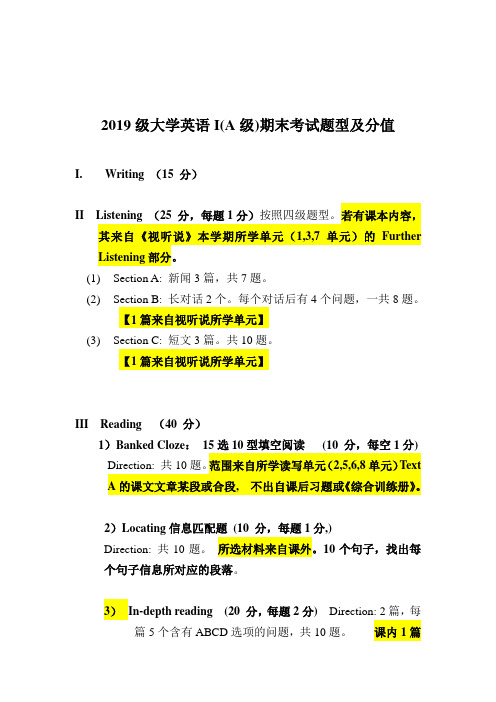
2019级大学英语I(A级)期末考试题型及分值I.Writing (15 分)II Listening (25 分,每题1分)按照四级题型。
若有课本内容,其来自《视听说》本学期所学单元(1,3,7单元)的Further Listening部分。
(1)Section A: 新闻3篇,共7题。
(2)Section B: 长对话2个。
每个对话后有4个问题,一共8题。
【1篇来自视听说所学单元】(3)Section C: 短文3篇。
共10题。
【1篇来自视听说所学单元】III Reading (40 分)1)Banked Cloze:15选10型填空阅读(10 分,每空1分)Direction: 共10题。
范围来自所学读写单元(2,5,6,8单元)TextA的课文文章某段或合段, 不出自课后习题或《综合训练册》。
2)Locating信息匹配题(10 分,每题1分,)Direction: 共10题。
所选材料来自课外。
10个句子,找出每个句子信息所对应的段落。
3)In-depth reading (20 分,每题2分) Direction: 2篇,每篇5个含有ABCD选项的问题,共10题。
课内1篇+ 课外1篇,课内的范围来自于《综合训练册》Units2,5,6,8和《快速阅读》全部单元的选择题型(ABCD选项)篇章阅读。
IV. English-to-Chinese Translation (10分)“英译汉”段落翻译。
要求:本题为翻译一段约80字的英语段落。
考察长句翻译的技巧,语言点的理解和语内连贯的处理。
材料选自所学读写单元text A的课文某段落或合段。
V.Chinese-to-English Translation (10分)“汉译英”段落翻译。
要求:本题为翻译一段100-120字的汉语段落,考察长句翻译的技巧,语言点的运用和语内连贯的处理。
材料选自所学读写单元text A的课后练习& 《综合训练册》相应单元的汉译英段落翻译习题。
大学英语期末试卷题型

《大学英语4》期末考试题型:
1、听力理解:20%(共20题,每题1分)
短对话7题、篇章理解1篇3题、Spot Dictation 1篇10题
2、阅读理解:25%
(1)、快速阅读1篇,5题,每题1分
(2)、传统仔细阅读2篇,10题,每题2分
3、介词和副词填空题:15% (新视野)(共15题,每题1分)
4、翻译:25%
(1)、句子翻译(中文翻译成英文):15% (5题,每题3分,15分)
(2)、段落翻译(英文翻译成中文):10% (1题,10分)
5、作文:15%
注意:考试课文范围:
《大学英语4(新视野)》:第三册第6,7,8,9,10单元
出题范围:
1、复习所学单元的生词、词组、搭配等,第三部分填空题在课后练习中出题:
《大学英语4(新视野)》:Section A课后Ex. IV; Section B课后Ex. IV
2、认真复习课文,段落翻译(英翻中)从课文的Section A中抽取。
《大学英语4(新视野)》:P147 para.3, 4, P173 para. 2,3 P204 para 12,18 P229 para. 9,10 P257 para. 6
3、认真复习课后练习,句子翻译(中翻英)从课后练习中抽取。
《大学英语4(新视野)》:课后练习Ex. XI (P157,以第六单元为例,其他单元复习对应相同类型的题目则可)。
4、其余题目均从试题库中抽取。
大学的英语四六级考试题型

大学的英语四六级考试题型大学的英语四六级考试题型(怎么样的)1、写作。
英语四六级写作要求考生根据所提供的信息及提示写出一篇短文,英语四级不少于120词,英语六级不少于150词。
作文分值占比15% ,时间30分钟。
2、听力。
英语四级听力部分各项占比:短篇新闻占7%,3篇,共7题,共450-500词。
长对话占8%,2篇,共8题,共240-280词。
听力篇章占20%,3篇,共10题,共220-240词。
英语六级听力部分各项占比:长对话占8%,2篇,8个题目,共280-320词。
听力篇章占7%,2篇,共7题,共240-260词。
讲话/报道/讲座占20%,3篇,共10个小题,总共约1200词。
3、阅读。
英语四六级阅读理解部分由词汇理解,长篇阅读,和仔细阅读组成。
选词填空占5%,10个题。
英语四级长度为200-250词,英语六级长度为250-300词。
长篇阅读占10%,10个题。
英语四级长度为1000词,英语六级长度为1200词。
仔细阅读占20%,2篇,10个题。
英语四级长度为300-350词,英语六级长度为400-450词。
4、翻译。
英语四六级翻译题型为段落汉译英。
翻译分值占比15%,时间30分钟。
英语四级长度为140-160个汉字,英语六级长度为180-200个汉字。
英语六级复习方法一、复习与自身兴趣结合,利用闲散时间很多考生在复习过程中,开始几天积极性高、主动性强,抱着词汇书按计划每天背单词、做习题,可是时间长了就难免产生厌倦情绪,感到备考枯燥无味,效率下降。
这个时候其实只要稍微改变一下复习方式,就能轻松地备考。
比如,把业余爱好和四六级复习相结合,会在阅读和背单词上产生巨大的效果。
喜欢看小说的同学,平时看中文小说,这个时候就改看中英文对照的。
看的时候注意关注每个作者的用词偏好,这些书中常常会反复出现某些常看但难记的单词,或某个单词的多项用法,而一词多用恰巧是复习四六级单词的一个重点。
爱看体育新闻、时尚杂志的同学也可以试着多看英语新闻,看电视的英语频道,从这些渠道来关注日常生活,在这样的情景下学习会变得更容易。
大学英语(3)期末复习资料(19秋)
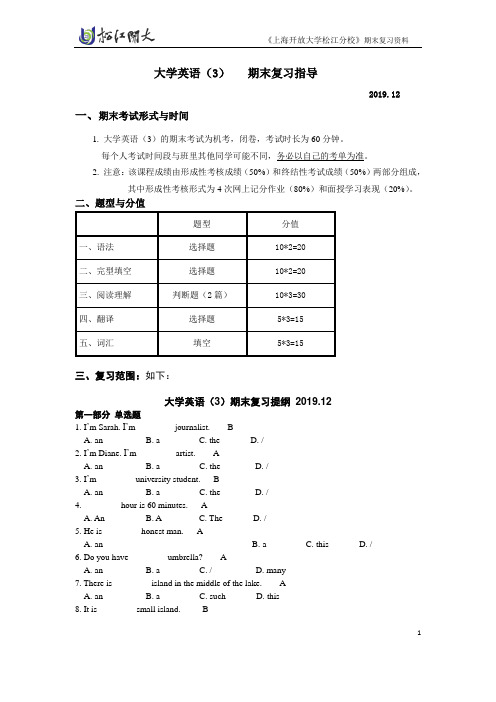
大学英语(3)期末复习指导2019.12一、期末考试形式与时间1. 大学英语(3)的期末考试为机考,闭卷,考试时长为60分钟。
每个人考试时间段与班里其他同学可能不同,务必以自己的考单为准。
2. 注意:该课程成绩由形成性考核成绩(50%)和终结性考试成绩(50%)两部分组成,其中形成性考核形式为4次网上记分作业(80%)和面授学习表现(20%)。
二、题型与分值题型分值一、语法选择题10*2=20二、完型填空选择题10*2=20三、阅读理解判断题(2篇)10*3=30四、翻译选择题5*3=15五、词汇填空5*3=15三、复习范围:如下:大学英语(3)期末复习提纲2019.12第一部分单选题1. I’m Sarah. I’m ________ journalist. BA. anB. aC. theD. /2. I’m Diane. I’m ________ artist. AA. anB. aC. theD. /3. I’m ________ university student. BA. anB. aC. theD. /4. ________ hour is 60 minutes. AA. AnB. AC. TheD. /5. He is ________ honest man. AA. anB. aC. thisD. /6. Do you have ________ umbrella? AA. anB. aC. /D. many7. There is ________ island in the middle of the lake. AA. anB. aC. suchD. this8. It is ________ small island. B1A. anB. aC. thisD. that9. France is ________ European country. BA. anB. aC. theD. /10. Hi Susan, I ________ David. Nice to meet you. AA. amB. isC. wasD. were11. ________ you a teacher? AA. AreB. IsC. DoD. Does12. Excuse me, ________ you speak English? BA. areB. doC. doesD. is13. Sorry, I ________ speak English. I speak a little Italian. AA. don’tB. am notC. doesn’tD. do14. –What________ you do? B–I’m a doctor.A. areB. doC. isD. does15. ________ your parents live in London? BA. AreB. DoC. DoesD. Were16. Is ________ your family? AA. thisB. theseC. theyD. them17. These are my ________, Sam and Anna. BA. childsB. childrenC. childrensD. child18. ________ are my brothers, and ________ is my best friend, Lesley. BA. This, theseB. These, thisC. This, thisD. That, those19. Your uncle’s wife is your ________. AA. auntB. sisterC. sister-in-lawD. brother-in-law20. Your aunt’s child is your ________. AA. cousinB. sisterC. brother-in-lawD. sister-in-law21. There ________ some nice parks in our area. BA. haveB. areC. isD. got22. There ________a supermarket near my house. CA. hasB. areC. isD. got23.________ you ________ a garden? AA. Have, gotB. Have, getC. Has, gotD. Has, get24. ________ she________ a new flat? BA. Has, getB. Does, haveC. Have, gotD. Does, got25. - Where are you from? A- I ________ New Zealand.A. am fromB. came fromC. comes fromD. from26. ________ you________ any brothers or sisters, Terry? BA. Have, getB. Have, gotC. Has, gotD. Do, got27. I go ________ every morning. BA. swimB. swimmingC. swimedD. swiming28. Do you like ________ basketball? BA. playB. playingC. playedD. to playing229. What ________ you doing? AA. areB. doC. isD. did30. What ________he doing? AA. isB. doesC. areD. do31. Naomi________ to Paris last week and she ________ a great time there. CA. went, hasB. go, hasC. went, hadD. goes, had32. I ________ know how to swim 2 years ago. BA. don’tB. didn’tC. won'tD. doesn’t33. –What ________ you ________ this weekend? B–I’m going to Paris.A. did, doB. are, doingC. have, doneD. were, doing34. – What ________ you ________ on Saturday? B– We are having a party.A. did, doB. are, doingC. have, doneD. were, doing35. ________ you have a good weekend? AA. DidB. HadC. HaveD. Are36. It ________ a really nice day. AA. wasB. wereC. doesD. has37. I ________ exhausted all weekend. AA. wasB. hadC. doD. did38. Benji________ dance the tango. AA. can’tB. can’t toC. not able toD. able to39. There are three________ paper on the table. AA. sheets ofB. sheet ofC. sheetsD. sheet40. My mother ________ the piano very well. We loved to listen to her. AA. playedB. playC. is playingD. plays41. He ________ a lot of money. AA. paidB. payedC. payesD. pay42. Jack ________ smoking. AA. stoppedB. stopedC. stoppsD. stop43. I ________ know how to swim until I was 12. AA. didn’tB. don’tC. won’tD. aren’t44. When I was a child I________ in the same room as my brother. BA. sleepB. sleptC. was sleepingD. have slept45. The little boy ________ into the river. BA. fallB. fellC. fellsD. falled46. A fridge is ________ than a freezer. AA. more importantB. importanterC. most importantD. much important47. Cable TV is ________ than a washing machine. AA. more usefulB. usefulerC. most usefulD. much useful48. Do you think your language is ________ to learn than English? AA. easierB. easiestC. more easierD. more easy49. What’s ________ thing about learning English? A3A. the hardestB. harderC. more harderD. hardest50. A microwave is ________ expensive than a fridge. BA. mostB. moreC. the moreD. much51. He is ________than his brother. CA. more tallB. most tallC. tallerD. more taller52. Please serve me ________ soup. CA. more someB. more theC. some moreD. some few53. My sister always goes to school at 7:00. She is ________ late. AA. neverB. usuallyC. sometimesD. occasionally54. He doesn’t often go out in the evening. He ________ stays at home reading books. AA. normallyB. sometimesC. seldomD. never55. –How ________ do you go out with friends? B–Every weekend.A. longB. oftenC. /D. much56. It’s the ________ longest river in the world. AA. ninetiethB. ninethC. nineD. nineteen57. Shall I ask him ________ third time? AA. aB. theC. moreD. some58. The bus stop is ________ the supermarket. AA. in front ofB. in the front ofC. at the front ofD. at front of59. There is a clock tower ________ the middle of the square. AA. inB. atC. onD. of60. There are some traffic lights ________ the left. AA. onB. inC. atD. to61. ________ up, please. AA. StandB. StandingC. To standD. To standing62. Please ________ open the window. AA. don’tB. notC. not toD. to not63. – Must they go home after school? B– No, they ________.A. mustn’tB. needn’tC. shouldn’tD. havn’t64. All dogs must ________ a lead. AA. be onB. onC. on toD. be to65. Maria spends hours ________ the shopping center. AA. inB. onC. /D. for66. I often go to bed ________ 11:00 pm. BA. onB. atC. inD. to67. How about ________ to the library in the morning? AA. goingB. goC. to goD. went68. There is a bridge ________ the river. AA. overB. onC. inD. across69. Congratulations ________ your great success in the exam. AA. onB. toC. forD. at470. My parents always give ________ money for my birthday. AA. meB. IC. mineD. my71. My mother never lets ________ help ________ with the cooking. BA. I, sheB. me, herC. I, herD. me, she72. ________ is a big family. AA. OursB. WeC. UsD. Ourselves73. You may use my pen. I will use ________. AA. hersB. herC. sheD. herself74. Our room is on the third floor and ________ is on the second. BA. themB. theirsC. theyD. themselves75. You ________ speak like that to your parents. AA. shouldn’tB. shouldn’t toC. ought to notD. ought not76. You ________ go to the party if you don’t want to. BA. shouldn’tB. don’t have toC. should haven’t toD. shouldn’t to have to77. You ________ pay me next time. AA. canB. can able toC. able toD. have78. She invited me ________ a dinner together. CA. haveB. havingC. to haveD. to having79. He was ________ for his pen name than for his real name. BA. well knownB. better knownC. best knownD. much known80. There is ________ milk left in the bottle. AA. a littleB. a fewC. a lotD. few81. I drink ________ water every day. BA. a fewB. a lot ofC. fewD. a little of82. There are ________ people in the room. AA. a lot ofB. a littleC. littleD. a lot83. I eat ________ fast food. I love it! AA. a lot ofB. a few ofC. littleD. many84. If you have a bad cold, ________ a lot of water. AA. drinkB. drinkingC. to drinkD. drank85. If you have a headache, a cup of mint tea ________. AA. helpsB. is helpingC. is to helpD. will help86. Where ________ for your next holiday? AA. are you goingB. are you going to goC. will you goingD. did you go87. Have you ever ________ to Beijing? AA. beenB. wentC. beingD. go88. ________ he ever climbed a tall mountain? BA. HaveB. HasC. DidD. Does89. I ________ her a minute ago. BA. have seenB. sawC. seeD. seen90. What ________ you like to do? AA. wouldB. areC. canD. have91. As students, we ________ attend classes on time! B5A. canB. mustC. mayD. ought92. –Will you stay for lunch? A–Sorry, ________. My brother is coming to see me.A. I can’tB. I needn’tC. I mustn’tD. I didn’t93. She ________ as an English teacher after she moved to Portugal. AA. workedB. workC. worksD. has worked94. The idea of the book came ________ her when she was on a long bus trip. AA. toB. inC. onD. at95. She says she ________writing in the future. BA. is continuingB. is going to continueC. is continuing toD. is to continuing96. The last book of the series ________ an instant success. AA. isB. wereC. are going toD. be97. She’s currently working ________ a project. AA. onB. toC. atD. with98. He ________ a lot of money to charity when he was alive. BA. givesB. gaveC. was givenD. has given99. The children ________ football on the playground now. CA. playsB. playC. are playingD. were playing100. I ________ watching TV when you called me yesterday. CA. amB. wereC. wasD. are第二部分完形填空1. P28, Unit 2My sister is a student and 1________her free time she works 2________ a tourist guide. She 3________ groups of tourists 4________ the university in Oxford. She doesn’t work from Monday to Thursday 5________she does a lot of work 6________the weekend. “I 7________ my job. I 8________ lots of nice people. 9________ I don’t like it when it 10________!”1. A. at B. in C. on2. A. like B. as C. the same as3. A. showed B. show C. shows4. A. around B. at C. on5. A. so B. and C. but6. A. at B. in C. to7. A. love B. am loving C. loved8. A. meet B. will meet C. met9. A. And B. So C. But10.A. rain B. rains C. will rainKey: 1. B 2. B 3. C 4. A 5. C 6. A 7. A 8. A 9. C 10. B2. P80, Unit 5Hi Orich! Thanks for your e-mail. 1________ sounds like you had a great weekend. I’d love to see6the flames next time I 2________ to visit.We went away for the weekend to visit my uncle. He has a farm out in the country. We travelled 3________train and arrived late 4________ the Friday night. On Saturday morning we wanted to go horse riding, but the weather 5________ terrible, 6________ we stayed in the house and watched some 7________. But in the afternoon the sun came out and we decided 8________for a walk. In the evening we di dn’t stay in the house. We had a barbecue in the garden.It didn’t rain and we 9________ a great time. Not as adventurous as you — but a good weekend 10________.Right, I’ve got to go.Take care and write soon. Paulo.1. A. This B. These C. It2. A. come B. comes C. will come3. A. on B. in C. by4. A. on B. in C. at5. A. is B. was C. would be6. A. and B. but C. so7. A. videos B. video C. videoes8. A. going B. go C. to go9. A. have B. has C. had10. A. someway B. anyway C. sometimesKey: 1. C 2. A 3. C 4. A 5. B 6. C 7. A 8. C 9. C 10. B3. P125, Unit 8•Be very careful when crossing the road. Remember that cars drive 1________ the left in the UK.•Never walk out into the road 2________ looking.•Always stop at the side of the road and don’t forget 3________ both ways before you cross. •When the road is clear, start crossing.•Don’t run, always walk, and remember to keep 4________ both ways until you get to the other side.•If 5________, always cross at a pedestrian crossing.•If there isn’t a pedestrian crossing 6________, make sure that drivers can see you and 7________ step out from behind a parked car.•8________ particular care when you get off a bus. Wait 9________ the bus drives away and the road is clear 10________ you cross the road.1. A. on B. at C. to2. A. without B. with C. while3. A. looking B. look C. to look74. A. looking B. look C. to look5. A. possibly B. possible C. impossible6. A. near B. near by C. nearby7. A. always B. seldom C. never8. A. Get B. Have C. Take9. A. until B. when C. after10.A. while B. before C. afterKey: 1. A 2. A 3. C 4. A 5. B 6. C 7. C 8. C 9. A 10. B4. P159, Unit 10I live in L'Aquila, a small mountain town 1________ the centre of Italy. The weather 2________ is fairly extreme. It's very hot in summer and it can be very cold in winter. Sometimes at night it can be 3________ with temperatures 4________ to below -15º.It’s one o f the coldest towns in Italy. The good thing is 5________ it’s dry. It doesn’t rain 6________, only in spring, and sometimes in late summer. In winter it snows. We can usually go skiing from December 7________ April. In autumn it can get quite windy, and sometimes we have problems 8________ trees falling on the road. And in November it sometimes gets quite foggy, 9________ along the river. But 10________other days, when it’s warm and sunny, the trees look so beautiful.1. A. on B. at C. in2. A. here B. there C. where3. A. freezing B. frozen C. freeze4. A. dropping B. dropped C. to drop5. A. what B. that C. which6. A. a lot B. lot C. a few7. A. in B. to C. by8. A. in B. for C. with9. A. especially B. specially C. especial10.A. on B. in C. atKey: 1. C 2. A 3. A 4. A 5. B 6. A 7. B 8. C 9. A 10. A5. P186, Unit 12Daniel Radcliffe 1________ born in 1990, the year when J.K. Rowling first thought of the now famous Harry Potter. He always wanted t o be 2________ actor, but his parents didn’t like the idea. But when he had the opportunity to 3________Harry Potter his parents agreed and they were very proud 4________him when the first film came out.The success of the films 5________ Daniel both rich and famous. But he still enjoys the simple pleasures of life. He 6________playing guitar and 7________ his favourite football team, Fulham. 8________present he is working on several stage and film projects. Daniel says that he 9________ to work as an actor for as long 10________he can.81. A. is B. was C. were2. A. an B. a C. the3. A. take B. do C. play4. A. of B. in C. for5. A. make B. have made C. has made6. A. love B. loves C. is loving7. A. support B. to support C. supporting8. A. On B. In C. At9. A. is going to continue B. continues C. is continuing10.A. such B. as C. likeKey: 1. B 2. A 3. C 4. A 5. C 6. B 7. C 8. C 9. A 10. B第三部分阅读理解Read the text and decide the following statements are true (T) or false (F).1. P27, Unit 2Tania is a personal shopper. She works with lots of different people. They ask her to buy something and she goes out to the shops and finds it. “Some people ask me to buy birthday or Christmas presents.”Jake is a TV researcher. His job is to find new ideas for TV programmes. He surfs the internet and looks for stories. But he also travels around the country talking to people. “I love my job. Every story I research is like a new world.”Debbie is a dog walker. She helps busy people look after their dogs. She takes them for walks, washes them and gives them food when their owners are away. “I love dogs and I like helpi ng people. It’s a perfect job.”1. Tania spends hours in shopping centres. T2. Debbie travels a lot. F3. Jake uses a computer. T4. Tania finds things at good prices. T5. Debbie and Tania help busy people. T2. P30, Unit 2Jade's morningI wake up at about 6:45. I get up and go for a run. Then I have a shower and get dressed. I have a quick breakfast and then I brush my teeth. I leave the house at 8 am. I walk to work. I get to the office at about 8:15. On Saturday and Sunday I get up at about 10:30 and have a long, slow breakfast.Tim's morningI wake up at about 10:30 and I have a cup of coffee with my mum. I have a shower, get dressed and I go to my friend's house. We study together, listen to music and play his computer games. At 1 o'clock we get the bus to the university. Our classes start at 2:30.Cassie's morningI get up at about 7:30. I make breakfast for Jade and her dad. We have breakfast at about 7:45. Then I have a shower, brush my teeth and get dressed. I work at home. I start work at about 8:30.9At about 10 o'clock I leave the house to do some shopping. When I get home I have a cup of coffee with Tim and read the newspaper.1. Tim gets up early. F2. Tim goes to university in the afternoon. T3. Cassie makes breakfast for her family. T4. Cassie goes shopping in the afternoon. F5. Jade walks to work. T3. P41, Unit 3I live in Oxford with my parents, in a small flat in the centre of town. It's in an old building but it's got a lift. It's on a quiet street about five minutes from the shops. It's got two bedrooms, my bedroom and my parents' bedroom, a living room and a small kitchen. It's not very big and it hasn't got a garden but there is a lovely rooftop terrace. I spend most of my time in the living room watching TV or in my bedroom listening to music.1. The author lives in the centre of town. T2. The flat has not got a lift. F3. The flat is near the shops. T4. The flat has a garden. F5. The author spends most of his time reading in the living room. F4. P61, Unit 4Double TakeTwo women, one face. Two very different characters, one destiny. Jane lives in a sleepy town in the USA. She is happily married with two children and a loving husband. Then one summer her double comes to town. She’s a criminal running from the police. That’s when Jane starts to have problems.Year ZeroIt’s the year 3000. All the clocks stop at midnight. The computers finally take control of the world. But a small group of hackers think they can control the machines. Can they save the planet from total destruction? Watch the film and see. The special effects are truly fantastic. Don’t miss it! Roses Only Live One DayA historic romance. Paris, 1789. Jean Pierre is a simple servant. Rose is the beautiful young daughter of his master. History brings them together, but the revolution breaks their hearts. A story of impossible love. But can there possibly be a happy ending? Watch it and find out!(1) Double Take is about two sisters. F(2) Year Zero is about the past. F(3) The story in Roses Only Live One Day happens in France. T(4) The special effects in Year Zero are very good. T(5) Double Take is about a criminal. T5. P78, Unit 510We had a great time last weekend. We decided to camp on Mount Olympus. You know, the mountain with flames that burn in the rock? It was really good!We travelled from Antalya by bus and arrived in Çirali at 6. The bus stopped on the main road and we walked a couple of kilometres to the village. We had a cup of tea and then we started the walk up the mountain. We arrived at the flames just as the sun started to go down.What a view! We watched the sky turn red and then the stars started to come out. It was really beautiful. The flames are incredible too. Some of them are really big. We cooked our food over one of them. We stayed awake all night. We passed the time playing cards and telling stories. One of my friends had a guitar and he played all our favourite songs. Next time you visit we can go there together. But for now — have a look at our fantastic photos!Take care,Orich1. They went camping on Mount Olympus last weekend. T2. They drove all the way to the village. F3. They arrived at the flames at midnight. F4. They didn’t sleep all that night. T5. Orich didn’t go with them. F6. P90, Unit 6It was about thirty years ago. My mum lived with a friend in London. One day she went to the supermarket to buy some things for a surprise birthday party for her friend.At the checkout she paid and put all the things into shopping bags. She put her flatmate’s present and card in with the shopping. As she turned to leave she bumped into another shopper. Her bags fell on the floor. The other shopper dropped his bags too. They helped each other put the things back in the right bags and they both left the supermarket. When my mum got home she couldn’t find th e card and birthday present in the bags.When the other shopper got home he found a parcel and a few letters in his shopping. One of them had an address on it. That evening he took the letters and parcel to the address. He rang the bell and my mum answered the door. She looked at the man. He was tall and dark and had a lovely smile. She invited him to the party. And, well, that was that! They fell in love.1. The author’s mother went to buy some things for a graduation party. F2. The story begins in a supermarket. T3. The author’s flatmate knew the man. F4. The man sent back the things thanks to the address on a letter. T5. The story is about the author’s father and mother. T7. P105, Unit 7A Day in the Life of Sara RobbinsSara Robbins is a newsreader on the radio. Many people don’t recognise her face, but everybody knows her voice!11Sara’s day usually starts when most people are asleep. Her alarm clock normally goes off at 3 am and she needs to be at the studios at four. “The roads are always very quiet at that time and I get to work very quickly.” At 6 am Sara says “good morning” to her listeners. The programme lasts for three hours. “After the programme we have a short meeting to talk about the next day and then we have a long, slow breakfast!”Sara never goes back home after work. “I really need to relax after the programme. I almost always do some sport and sometimes I meet up with a friend.”Sara doesn’t often go out in the evenings during the week. She prefers to stay at home. She loves cooking and hardly ever eats out in the restaurants. “I don’t really have the time.”At weekends, her life is quite different. She often goes away for the weekend. “I love going to Rome or Paris or New York.” She loves the theatres and the art galleries, and says that “the shopping is great!”1. Sara wakes up at 3 am. T2. The program finishes at 10 am. F3. She goes straight home after work. F4. She often eats out during the week. F5. She enjoys travelling at the weekend. T8. P114, Unit 7Designer clothes? A luxury home? Jill Summers, 28, doesn’t want these things. She says her lottery win of £2m isn’t going to change her life.Jill and her husband Derrick, 30, live and work on a farm in Ashford, south-east England. They get up at 4:30 am, seven days a week, 365 days a year.“We’re not stopping now, just because we’ve had some good luck,” says Jill. She and Derrick say they aren’t leaving the family home. “We’re very happy here,” says the lucky Mrs. Summers.Next month the couple are going on their first holiday for eight years. “We’re travelling around Asia and Australia for a few months,” says Derrick. And what about the business? “We’re paying someone to look after the farm. For the first time in eight years.”And what else are they doing with the money? “Well, tomorrow we’re picking up our new car. And next week we’re having a big party for all our friends and family. We’re giving 10% of the money to charity. But we aren’t planning any big changes.”And does she still play the lottery? “Why not, some of the money goes to good causes.”1. Jill and her husband get up at 4:30 every morning. T2. They are going to buy a new house. F3. They are going on a holiday. T4. They haven’t paid anyone to look after the farm during the last eight years. T5. Jill will not play lottery any more. F9. P130, Unit 8Hide and SeekIn this game one child counts to a hundred. All the other children find a good place to hide. The12boy or girl who counted to a hundred must then go and find the other children. The child who is still hiding at the end of the game is the winner.Snap!This is a very simple card game. Two people can play. The two people have the same number of cards. They take it in turns to put the cards down on the table. If two consecutive cards are the same, they must shout “Snap!”.I spyThis is a word game. Two or more people can play. One person chooses an object they can see, and says “I spy with my little eye something beginning with…” and the first letter of the object they can see. The other players must try to guess the word. This is a very good game for long car journeys!1. The child who counts to a hundred is the winner. F2. Snap is a card game. T3. At least two people are needed to play Snap. T4. Two or more people can play I spy. T5. While playing I spy, one of the players must say the word of the object they can see. F10. P138, Unit 9What Should I Buy?The Art of Present BuyingShould buying presents be difficult? Tami Shantra believes not. Here she offers some tips for pain-free present buying.1. You shouldn’t leave present buying until the last minute.2. You should spend some time thinking about the person you’re buying for before you go shopping.3. You should never spend more than you can afford.4. You should always spend a little time and thought on the presentation.5. You should always try to give the person a present on the special day if possible.6. You should always buy a simple card to go with the present and write a short message inside it.7. You shouldn’t buy clothes or shoes for someone you don’t know very well.8. If you don’t know the person very well, it’s better to buy something quite basic, like a box of chocolates or a bunch of flowers.9. Surprise presents are the best presents. You don’t need to wait for a special occasion to buy a present for a person you love.10. Last but not least: remember that buying presents is a pleasure, not a duty. And they shouldalways be given with smile!1. It’s better to spend more than you can afford. F2. You should always spend a little time on the presentation. T3. You should never give the present on the special day. F4. You should buy shoes for someone you don't know very well. F5. The best presents are surprise presents. T1311. P140, Unit 9The World’s Greatest Food FightOn the last Wednesday of August, the Spanish town of Buñol, celebrates the world’s biggest food fight, the “tomatina”. A crowd of up to 20,000 people meet in the town’s main square and throw tomatoes at each other.The first tomatina took place in the mid-1940s. It started with an argument between two men from the town.The men started throwing tomatoes at each other. The argument turned into a game, and everyone on the street started throwing tomatoes. They had so much fun they decided to celebrate the tomatina every year on the same day.The fight starts at 12 noon, at the sound of an enormous firework. It finishes exactly one hour later with the sound of second banger. The participants must not throw any tomatoes before or after these signals. For many years participants brought their own tomatoes, but in 1980 the local council started organising the event and now they pay for the 40,000 kilos of tomatoes used each year. The tomatina is now an international festival and people from all over the world come to Buñol to enjoy the fun.1. Tomatina is the largest food fight in the world. T2. Tomatina first took place more than a century ago. F3. Tomatina originates from an argument. T4. The fight lasts exactly one hour. T5. It is a religious festival. F12. P143, Unit 9DiwaliDiwali (the festival of lights) is one of the most important dates in the Hindu calendar. It is celebrated by Hindus all over the world and takes place in the Hindu month of Aswin (October/November). It lasts for four days and ends with the celebration of the Hindu New Year.On the first day, people decorate their homes with rangolis, traditional patterns made with coloured powders. They light hundreds of tiny oil lamps and make traditional sweets. They buy something new for the house or some jewellery for the women. It is lucky to buy something silver.On the second day, it is traditional to get up early and take a bath before sunrise. In Southern India, people take oil baths, using traditional herbs and fragrant powders.On the third day, the night before the new moon rises, they celebrate with an enormous fireworks display which can last for five or six hours. The noise and smoke is incredible.On the last day, the first day of the Hindu New Year, people visit family members and business colleagues to give them sweets, dry fruits and gifts. All across India, normal life comes to a stop as everyone celebrates the new year.1. Diwali is celebrated in October or November. T2. On the first day, people like to buy something gold. F3. On the second day, it is traditional to take a bath after sunrise. F4. The fireworks display can last for more than five hours. T14。
大学英语考试分值分布
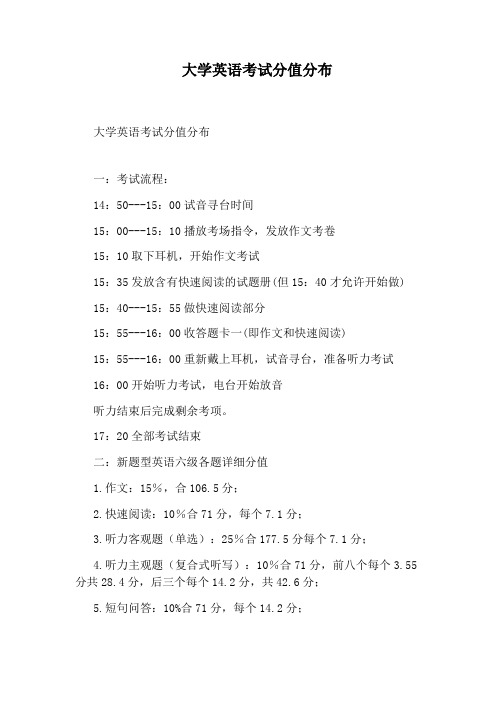
大学英语考试分值分布大学英语考试分值分布一:考试流程:14:50---15:00试音寻台时间15:00---15:10播放考场指令,发放作文考卷15:10取下耳机,开始作文考试15:35发放含有快速阅读的试题册(但15:40才允许开始做)15:40---15:55做快速阅读部分15:55---16:00收答题卡一(即作文和快速阅读)15:55---16:00重新戴上耳机,试音寻台,准备听力考试16:00开始听力考试,电台开始放音听力结束后完成剩余考项。
17:20全部考试结束二:新题型英语六级各题详细分值1.作文:15%,合106.5分;2.快速阅读:10%合71分,每个7.1分;3.听力客观题(单选):25%合177.5分每个7.1分;4.听力主观题(复合式听写):10%合71分,前八个每个3.55分共28.4分,后三个每个14.2分,共42.6分;5.短句问答:10%合71分,每个14.2分;6.仔细阅读理解:15%合106.5分,共10个每个10.65分。
7.完形填空:10%合71分,共20个每个3.55分。
8.句子翻译:5%合35.5分,共5个,每个7.1分。
9.加起来总计:100%合710分。
10.作文分数占总分的15%,也就是106.5分,在这部分你要达到63.9分为及格。
答题时间为30分钟。
11.快速阅读占总分的10%,即71分,在这部分你要达到42.6分为及格分。
题号为1-10题,答题时间为15分钟。
12.听力部分占总分的35%,即248.5分,在这部分的'及格分为149.1分。
题号为11-35题,答题时间为35分钟。
13.是一篇篇章词汇理解和两篇传统的阅读理解,总分数为177.5分。
在这部分你要达到106.5分为及格分。
题好为36-66。
答题时间为25分钟。
14.是完形填空(极大可能考这个),占总分的10%,即71分,在这部分你要达到42.6分及格。
题号67-86,答题时间为15分钟。
大学英语四级各题分值
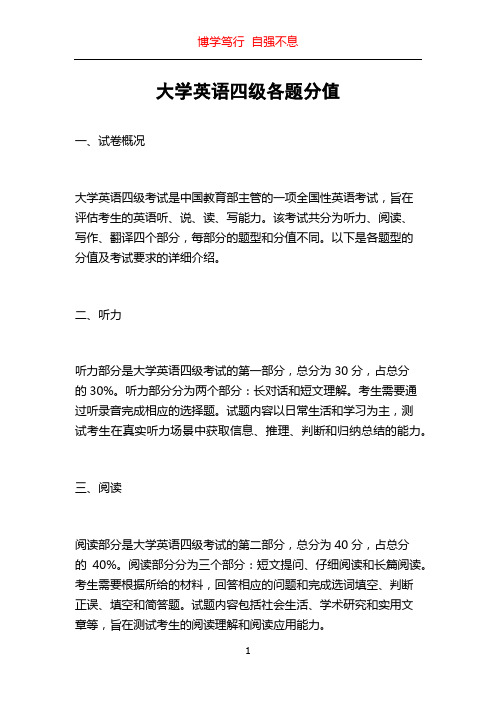
大学英语四级各题分值一、试卷概况大学英语四级考试是中国教育部主管的一项全国性英语考试,旨在评估考生的英语听、说、读、写能力。
该考试共分为听力、阅读、写作、翻译四个部分,每部分的题型和分值不同。
以下是各题型的分值及考试要求的详细介绍。
二、听力听力部分是大学英语四级考试的第一部分,总分为30分,占总分的30%。
听力部分分为两个部分:长对话和短文理解。
考生需要通过听录音完成相应的选择题。
试题内容以日常生活和学习为主,测试考生在真实听力场景中获取信息、推理、判断和归纳总结的能力。
三、阅读阅读部分是大学英语四级考试的第二部分,总分为40分,占总分的40%。
阅读部分分为三个部分:短文提问、仔细阅读和长篇阅读。
考生需要根据所给的材料,回答相应的问题和完成选词填空、判断正误、填空和简答题。
试题内容包括社会生活、学术研究和实用文章等,旨在测试考生的阅读理解和阅读应用能力。
四、写作写作部分是大学英语四级考试的第三部分,总分为30分,占总分的30%。
写作部分分为两个任务:写作短文和写作作文。
考生需要根据所给的题目和要求,完成相应的写作任务。
写作短文要求考生完成一篇80~100个单词的短文;写作作文要求考生完成一篇150~200个单词的作文。
试题内容涉及各个方面的社会热点问题,评价考生的语言表达和逻辑思维能力。
五、翻译翻译部分是大学英语四级考试的最后一部分,总分为20分,占总分的20%。
翻译部分分为中译英和英译中两个任务。
考生需要根据所给的中文句子或英文句子,完成相应的翻译任务。
试题内容涵盖社会热点、文化差异、科技进展等各个方面的内容,测试考生的翻译能力和跨文化交际能力。
六、总结总的来说,大学英语四级考试包含听力、阅读、写作和翻译四个部分,总分为120分。
听力和阅读部分占总分的70%,要求考生对英文材料进行听力理解和阅读理解;写作和翻译部分占总分的50%,要求考生用准确、连贯的英语表达自己的观点和完成翻译任务。
考生在备考过程中应重点关注每个部分的考试要求和题型,合理安排学习时间,多做练习,提高自己的英语水平。
大学英语 考核方式

大学英语分级教学学业考试大纲课程名称:大学英语(COLLEGE ENGLISH)学分:14学时:224测试对象:全校非英语专业本科生一、课程考试目的南京航空航天大学的大学英语课程考试是大学英语教学每学期结束后的综合测试,是检测教学大纲执行情况以及评估教学质量的一种有效手段,是获取教学反馈信息的主要来源和改进教学工作的重要依据;其目的是客观、公正、准确地检测和评估学生的英语综合应用能力,特别是听说能力,考核其英语能力是否达到教育部版布的《大学英语课程教学要求》中的所提出的各项知识与技能要求。
二、考试内容与要求南京航空航天大学大学英语课程考核“综合英语”和“视听说”,其中综合英语考试重点检测和评估学生对本学期所学的读写译综合知识和技能,视听说重点检测学生对英语听说能力和技能的综合运用能力。
综合英语考试具体内容及要求如下(需对照试卷核对):第一部分:阅读理解(Reading Comprehension)阅读理解部分测试学生通过阅读获取书面信息的能力,包括快速阅读(Skimming and Scanning)和仔细阅读(Reading in Depth)。
所占分值比例为55%,其中快速阅读部分15%,仔细阅读部分40%。
考试时间为55分钟。
第二部分:完型填空(Cloze)完型填空测试学生各个层面上的语言理解能力及语言运用能力。
短文长度为220-250词,内容是学生所熟悉的题材。
这部分的分值比例为20%,考试时间为15分钟。
第三部分:翻译(Translation)翻译部分测试学生用英语进行书面表达的能力,所占分值为10%,考试时间为10分钟。
翻译部分为汉译英,共10个句子。
一句一题,句长为15-30词。
句中的一部分已用英文给出,要求考生根据全句意思将汉语部分译成英语。
翻译必须符合英语的语法结构和表达习惯,要求用词准确。
第四部分:写作(Writing)写作部分测试学生用英语进行书面表达的能力,所占分值为15%。
大学英语四级考试题型简介概要
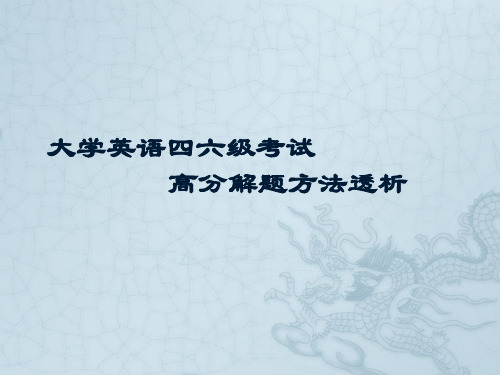
写作
写作题目常见题型
大学英语四六级考试作文题型主要议论文、 应用文和图表作文为主,很少考查记叙文。
议论文的考试题型具体有以下两类:
1. 阐述社会现象或说明原因型考题
题目特点:典型的社会现象表述或者分析 问题说明原因,如四级2007年12月,2008 年12月,六级2007年12,2008年6月等历年 的考题
(1)听前:略读选项,预测考题 (2)听中:理解大意,捕捉重点 (3)听后:排除干扰,果断作答
4. 复合式听写
复合式听写一般是一篇250词左右的文章, 文中有11处空格,前8个空格要求填入所缺 的单个单词,每个词0.5分,共计4分。后3 个空格较长,要求填入漏掉的句子。每空2 分,共计六分。文章共朗读三遍,第一和 第三遍没有时间空隙,第二遍时最后3个空 留有部分时间做题。复合式听写重点考查 考生语言综合运用能力,考生不仅要有良 好的听的能力,还要有较强的拼写能力、 记笔记能力和书面表达能力。
(1) 首先阅读15个选型,判断备选单词词性, 并对词性进行标注;
(2) 根据文章空格前后的内容,判断空格处需 要填入单词的词性。然后根据选项中的词性进 行排除,缩小选择范围。再根据上文的语义, 在相应的词性中选择合适的单词。
2.六级简答题
类似前面提到的快速阅读题,六级深度阅读中 的第一题主要考查考生的通过略读和跳读抓住 考点信息的能力,要求用10个以内的单词准确 表述答案,字数超出会被扣分。
大学英语四六级考试 高分解题方法透析
四六级考试题型
1.Writing: 30 分钟, 107分(15%) 2.Reading comprehension(skimming and
scanning ) 15分钟,70分(10%) (写作与快速阅读卷一起发,一起收,所
大学英语考试题型
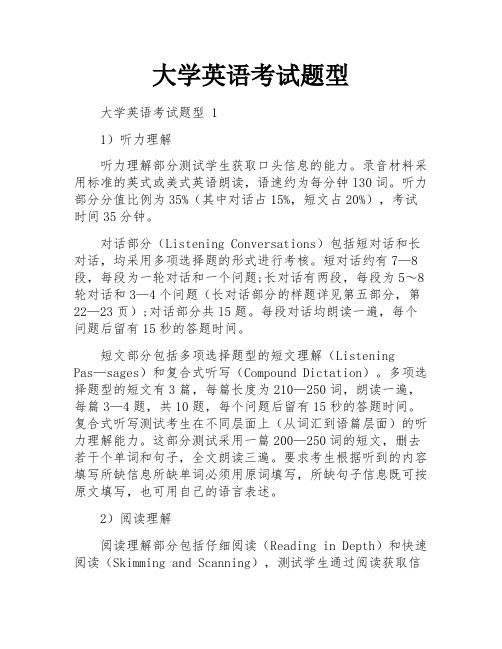
大学英语考试题型大学英语考试题型 11)听力理解听力理解部分测试学生获取口头信息的能力。
录音材料采用标准的英式或美式英语朗读,语速约为每分钟l30词。
听力部分分值比例为35%(其中对话占15%,短文占20%),考试时间35分钟。
对话部分(Listening Conversations)包括短对话和长对话,均采用多项选择题的形式进行考核。
短对话约有7—8段,每段为一轮对话和一个问题;长对话有两段,每段为5~8轮对话和3—4个问题(长对话部分的样题详见第五部分,第22—23页);对话部分共l5题。
每段对话均朗读一遍,每个问题后留有15秒的答题时间。
短文部分包括多项选择题型的短文理解(Listening Pas—sages)和复合式听写(Compound Dictation)。
多项选择题型的短文有3篇,每篇长度为210—250词,朗读一遍,每篇3—4题,共10题,每个问题后留有15秒的答题时间。
复合式听写测试考生在不同层面上(从词汇到语篇层面)的听力理解能力。
这部分测试采用一篇200—250词的短文,删去若干个单词和句子,全文朗读三遍。
要求考生根据听到的内容填写所缺信息所缺单词必须用原词填写,所缺句子信息既可按原文填写,也可用自己的语言表述。
2)阅读理解阅读理解部分包括仔细阅读(Reading in Depth)和快速阅读(Skimming and Scanning),测试学生通过阅读获取信息的能力;所占分值比例为35%(其中仔细阅读部分25%,快速阅读部分l0%。
)考试时间40分钟。
仔细阅读部分要求考生阅读三篇短文。
两篇为多项选择题型的短文理解测试,每篇长度为300—350词。
一篇为选词填空(Banked Cloze)或简答题(Short Answer Questions)。
选词填空篇章长度为200—250词,简答题篇章长度为300—350词。
阅读部分测试考生在不同层面上的阅读理解能力,包括理解主旨大意和细节、综合分析以及根据上下文推测词义等。
大学英语四六级考试题型与评分方法

大学英语四六级考试题型与评分方法大学英语四六级考试题型与评分方法1.试卷构成四级和六级的试卷构成相同,由写作、听力理解、阅读理解和翻译四个部分组成,分值比例为:写作15%,听力35%,阅读35%,翻译15%。
考试时间为130分钟。
四级和六级的试卷结构、测试内容、测试题型、分值比例和考试时间如下表所示:其中选择题的评分是使用答题卡评分,这里就不需要多解释了,关于作文和翻译题的评分,小编给大家稍微解释一下:2.作文评分标准满分为15分,成绩分为六个档次:13-15分、10-12分、7-9分、4-6分、1-3分和0分。
各档次的评分标准见下表:分数档与评分标准13-15分切题。
表达思想清楚,文字通顺、连贯,基本上无语言错误,仅有个别小错。
10-12分切题。
表达思想清楚,文字较连贯,但有少量语言错误。
7-9分基本切题。
有些地方表达思想不够清楚,文字勉强连贯;语言错误相当多,其中有一些是严重错误。
4-6分基本切题。
表达思想不清楚,连贯性差。
有较多的严重语言错误。
1-3分条理不清,思路紊乱,语言支离破碎或大部分句子均有错误,且多数为严重错误。
0分未作答,或只有几个孤立的词,或作文与主题毫不相关。
3.翻译评分标准满分为15分,成绩分为六个档次:13-15分、10-12分、7-9分、4-6分、1-3分和0分。
各档次的评分标准见下表:分数档与评分标准13-15分译文准确表达了原文的意思。
用词贴切,行文流畅,基本上无语言错误,仅有个别小错。
10-12分译文基本上表达了原文的意思。
文字通顺、连贯,无重大语言错误。
7-9分译文勉强表达了原文的意思。
用词欠准确,语言错误相当多,其中有些是严重语言错误。
4-6分译文仅表达了一小部分原文的意思。
用词不准确,有相当多的严重语言错误。
1-3分译文支离破碎。
除个别词语或句子,绝大部分文字没有表达原文意思。
0分未作答,或只有几个孤立的词,或译文与原文毫不相关。
4.分数换算大学英语四、六级考试是标准相关-常模参照的`标准化考试。
大学英语四级题型及分值分布是什么?
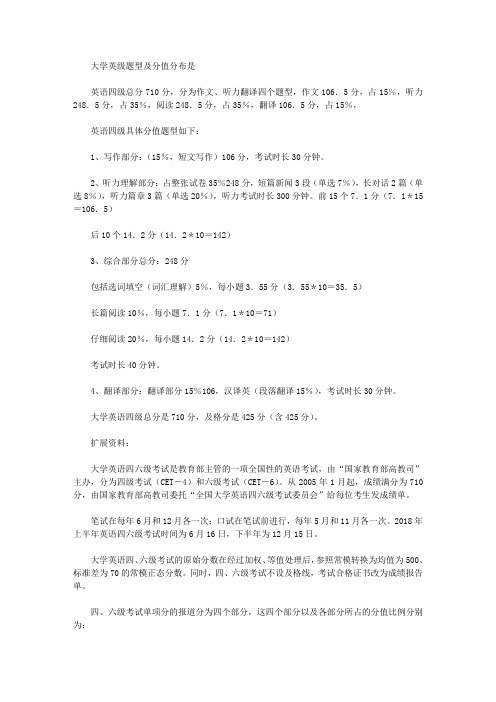
大学英级题型及分值分布是英语四级总分710分,分为作文、听力翻译四个题型,作文106.5分,占15%,听力248.5分,占35%,阅读248.5分,占35%,翻译106.5分,占15%,英语四级具体分值题型如下:1、写作部分:(15%,短文写作)106分,考试时长30分钟。
2、听力理解部分:占整张试卷35%248分,短篇新闻3段(单选7%),长对话2篇(单选8%),听力篇章3篇(单选20%),听力考试时长300分钟。
前15个7.1分(7.1*15=106.5)后10个14.2分(14.2*10=142)3、综合部分总分:248分包括选词填空(词汇理解)5%,每小题3.55分(3.55*10=35.5)长篇阅读10%,每小题7.1分(7.1*10=71)仔细阅读20%,每小题14.2分(14.2*10=142)考试时长40分钟。
4、翻译部分:翻译部分15%106,汉译英(段落翻译15%),考试时长30分钟。
大学英语四级总分是710分,及格分是425分(含425分)。
扩展资料:大学英语四六级考试是教育部主管的一项全国性的英语考试,由“国家教育部高教司”主办,分为四级考试(CET-4)和六级考试(CET-6)。
从2005年1月起,成绩满分为710分,由国家教育部高教司委托“全国大学英语四六级考试委员会”给每位考生发成绩单。
笔试在每年6月和12月各一次;口试在笔试前进行,每年5月和11月各一次。
2018年上半年英语四六级考试时间为6月16日,下半年为12月15日。
大学英语四、六级考试的原始分数在经过加权、等值处理后,参照常模转换为均值为500、标准差为70的常模正态分数。
同时,四、六级考试不设及格线,考试合格证书改为成绩报告单。
四、六级考试单项分的报道分为四个部分,这四个部分以及各部分所占的分值比例分别为:英语四级各档的分数分布是:听力(35%)249分、阅读(35%)249分、综合(10%)70分、写作和翻译(20%)142分。
大学英语期末考试题型
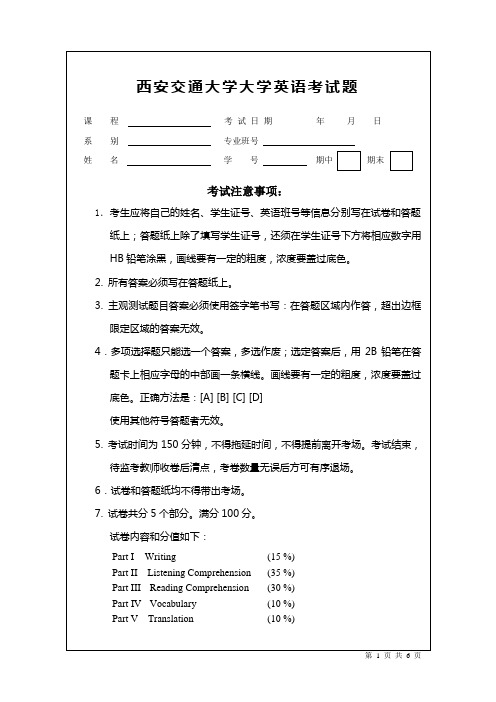
PartIVVocabulary(10%)
Part VTranslation(10%)
Part I Writing (15%)
Directions: For this part, you are allowed 30 minutes to write a short essay entitledHow to Deal with Sub-Health.You should write at least 120 words following the outline given below.
[D] How to Take the Lead in Making Friends
…
Passage Two
Questions19 to21 are based on the passage you have just heard.
19. [A] It needs your bravery.[B] It may increase your wealth.
1. [A] The professor’s lecture is boring but crucial.
[B] It’s not necessary for him to attend the lecture.
[C] The man should have been more attentive in the lecture.
答题纸上除了填写学生证号还须在学生证号下方将相应数字用hb铅笔涂黑画线要有一定的粗度浓度要盖过底色
西安交通大学大学英语考试题
课程考试日期年月日
系别专业班号
姓名学号期中期末
考试注意事项:
大学英语期末题型分值总结

2013—2014学年上学期2012级K班《英语读写(4)》《英语听力(4)》期末考题型、指令及分数2012级K班《英语读写(4)》(满分100)考试时间:90分钟1.词汇与结构TVS-S410题(10%)Directions: Choose the best answer to complete the following sentences.2.构词法运用TWB-S4 10题(10%)Directions: Complete the following sentences with the appropriate forms of the words given in brackets.3. 长篇阅读(TLPR-S4)1篇(20%)10小题Directions:In this section, you are going to read a passage with ten statements attached to it. Each statement contains information given in one of the paragraphs. Identify the paragraph from which the information is derived. Y ou may choose a paragraph more than once. Each paragraph is marked with a letter. Answer the questions by marking the corresponding letter. (出题形式参考四级新题型样题)4. 深度阅读TRD -S4 1篇(10%)共10小题Directions: In this section, there is a passage with ten blanks. Y ou are required to select one word for each blank from a list of choices given in a word bank following the passage. Read the passage through carefully before making your choices. Each choice in the bank is identified by a letter. Please choose the corresponding letter. Y ou may not use any of the words in the bank more than once.5. 传统阅读TPR-S4 1篇(20%)共5小题Directions: The passage in this section is followed by some questions or unfinished statements. For each of them there are four choices marked A), B), C) and D). Y ou should decide on the best choice and choose the corresponding letter.6. 汉译英TCE-S4 1题(15%)1段Directions: For this part, you are allowed 30 minutes to translate a passage from Chinese into English. (出题形式参考四级新题型样题)7. 写作TGW-S4 1题(15%)1篇Directions: For this part, you are allowed 30 minutes to write an essay. You should write at least 120 words but no more than 180 words.2012级K班《英语听力(4)》(满分100)考试时间:30分钟1.短对话(TLSC-S4)40%,10小题,每题4分Directions: Listen to the following ten short conversations and choose the best answer to each of the questions.2.长对话(TLLC-S4)20%,1个长对话,5个问题;每题4分。
- 1、下载文档前请自行甄别文档内容的完整性,平台不提供额外的编辑、内容补充、找答案等附加服务。
- 2、"仅部分预览"的文档,不可在线预览部分如存在完整性等问题,可反馈申请退款(可完整预览的文档不适用该条件!)。
- 3、如文档侵犯您的权益,请联系客服反馈,我们会尽快为您处理(人工客服工作时间:9:00-18:30)。
Unit 2 Talking books
New Words
1. struggle 2. confession 3. demoralize 4. prohibit 5. immorality 6. appetite 7. classification 8. recommendation 9. circulation 10. enrich
Digging
MP3
Para.9 虚拟语气 If those principals had been female instead of
male, I wonder whether their questions, and my answers, would have been different. My guess is that they would have been.
免费的; 表扬的;赞扬的
8) expertise 专家知识 9) console 安慰 10)groan 抱怨
11) reward 奖赏;回报;报偿 12) messy 凌乱的;杂乱的;肮脏的 13) approvingly 赞同的;赞许的 14) principal 15) coordinator 16) comply with 遵守;服从 17) take away 除去;移走;拿走 18) bring up提出;开始讨论 19) share in 20) have an advantage over sb
Unit 2 经典语句
Para.1. It's the first time I have had the leisure of
Unit 1 About men; one man’s kids
Unit 1 重点词汇
1) stale (食物)不新鲜的 2) arrangement 安排 ;布置 3) singular 突出的;非凡的 4) transaction 交易;买卖 5) erase
消除(不好的记忆、感觉或想法 6) hint 少许;微量 7) complimentary
大学英语IV 期末考试备考指导
大学英语4(GE2002) 期末考试题型及分值分布:
Part I Listening (每题1分,共20分,短对话+长对话+1 passage) Part II Vocabulary (每题1分,共30分) Part III Reading Comprehension (2篇,每题2分,共20分) Part IV Para. Translation (共15分) Part V Writing (15分)
Digging
MP3
Para. 7 I gave that answer to those principals, who were mostly
male, because I thought they wanted a “male’’ response. This meant talking about intellectual matters. If I had taken a different course and talked about my interest in helping children ቤተ መጻሕፍቲ ባይዱn their emotional development, it would have been seen as closer to a “female’’ answer. I even altered my language, not once mentioning the word “love’’ to describe what I do indeed love about teaching. My answer worked; every principal nodded approvingly.
Digging
MP3
Para. 4 My work is not traditional male work. It’s not a singular pursuit. There is not a large pile of paper to get through or one deal to transact. I don’t have one area of expertise or knowledge. I don’t have the singular power over language of a lawyer, the physical force of a construction worker, the command over fellow workers of a surgeon, the wheeling and dealing transactions of a businessman. My energy is not spent in pursuing, climbing, achieving, conquering or cornering some goal or object.
Unit 2 重点词汇
New Words
11. revolve 12. repetitive 13. envy 14. long to do 15. look upon/ on...as 16. part with 17. stumble upon 18. be honest with 19. on the side 20. nothing but
温馨提示: 注意期末考试时间
提醒:
1. 考生须携带2B铅笔和钢笔,不用带收音机。 2. 答题卡上学号请务必填写清楚。注意13406…首数字1经常被填涂为0。
复习指导
• 听力范围:《新视野听说教程3》 Unit 1,2,3,5,6 • 词汇题目,出自《大学英语IV 词汇语法》 • 阅读理解,出自2013-2014 CET-4阅读真题。 • 中国文化段落翻译,出自《大学英语IV 中国文化段落翻译强化练习》 • 写作,出自《大学英语IV 写作强化练习》
